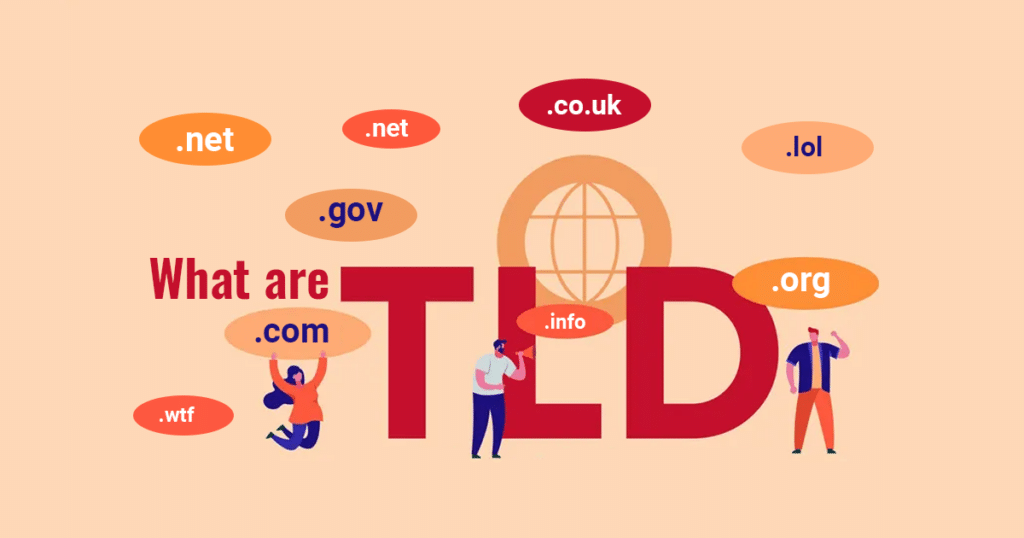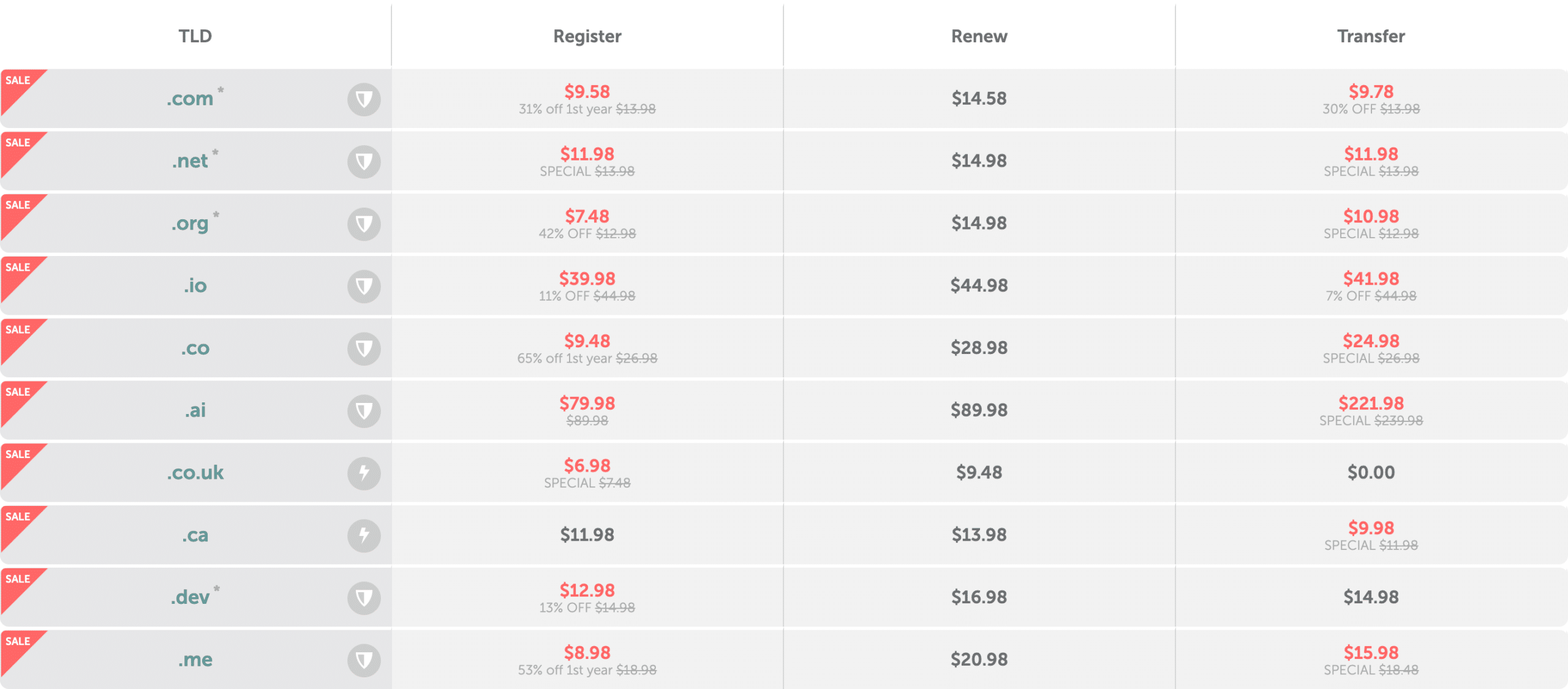If you are looking for a domain name for your website, you might have noticed that some domain names are much more expensive than others. For example, a .com domain name can cost you around $10 per year, while a .inc domain name can cost you over $1000 per year. Why is there such a huge difference in domain name prices? And why do some domain names have higher renewal fees than others?
In this blog post, we will explain the factors that affect the pricing of domain names, and why some domain names are considered “special” and have higher costs and fees.
What are TLDs and how are they priced?

TLDs, or top-level domains, are the last part of a domain name, such as .com, .net, .org, etc. They are also known as domain extensions or suffixes. TLDs are managed by organizations called registries, which set the rules and policies for each TLD. Registries also determine the wholesale price of each TLD, which is the price that registrars (the companies that sell domain names to customers) pay to register or renew a domain name.
The wholesale price of a TLD depends on several factors, such as:
- The demand and popularity of the TLD. For example, .com is the most popular and widely used TLD in the world, so it has a higher demand and price than other TLDs.
- The supply and availability of the TLD. For example, some TLDs have a limited number of domains available, such as .ai or .gg, which are country code TLDs (ccTLDs) for Anguilla and Guernsey respectively. These TLDs have a lower supply and higher price than other TLDs.
- The cost and overhead of running the registry. For example, some TLDs require more technical and administrative resources to maintain and operate, such as .app or .dev, which are secure TLDs that require HTTPS encryption for all websites. These TLDs have a higher cost and price than other TLDs.
- The marketing and branding strategy of the registry. For example, some TLDs are designed to appeal to specific niches or audiences, such as .inc for businesses or .me for personal websites. These TLDs have a higher price than other TLDs to create a sense of exclusivity and value.
What are special domain names and how are they priced?

Special domain names are domain names that have a higher value or demand than other domain names within the same TLD. For example, all 1, 2 and 3 character domains, as well as common dictionary keywords, are considered special. Special domain names are usually more memorable, catchy, and relevant to the website’s content or purpose.
Special domain names are priced differently than regular domain names within the same TLD. The pricing of special domain names depends on several factors, such as:
- The market value of the domain name. For example, some special domain names can be sold for millions of dollars in the secondary market (the market where existing domain names are bought and sold), such as carinsurance.com or business.com. These domain names have a higher market value and price than other domain names.
- The availability and scarcity of the domain name. For example, some special domain names are very rare and hard to find, such as one-letter or one-number domains, or domains that match popular brand names or trademarks. These domain names have a lower availability and higher price than other domain names.
- The premium status of the domain name. For example, some registries designate certain special domain names as premium domains, which means that they have a higher wholesale price and renewal fee than other domain names within the same TLD. These domain names have a premium status and price to reflect their quality and desirability.
Why do some special domain names have higher renewal fees than others?

The renewal fee of a domain name is the fee that you pay to keep your domain name registered for another year or period of time. The renewal fee of a regular domain name is usually the same as the registration fee (the fee that you pay to register your domain name for the first time). However, some special domain names have higher renewal fees than their registration fees.
The reason why some special domain names have higher renewal fees than their registration fees is because some registries use a pricing model called tiered pricing or variable pricing. This means that they charge different prices for different stages of the domain name lifecycle, such as registration, renewal, transfer, etc.
The rationale behind tiered pricing or variable pricing is to encourage customers to register more domains by offering lower registration fees, while also generating more revenue by charging higher renewal fees for valuable domains. This way, registries can balance the supply and demand of their TLDs, and also prevent domain name speculation or hoarding (the practice of registering domain names with the intention of reselling them for a profit).
How to find the best domain name for your website?

Finding the best domain name for your website can be challenging, especially if you are looking for a special domain name that is relevant, catchy, and affordable. Here are some tips to help you find the best domain name for your website:
- Use a domain name generator tool, such as Namecheap’s Beast Mode, to search for available domain names based on your keywords, preferences, and budget. You can also filter your results by TLD, length, price, etc.
- Compare different TLDs and prices, and see which one suits your website’s purpose, audience, and niche. You can use a domain price search tool, such as Namecheap’s Domain Prices, to find the cost of popular domains for up to 10 years.
- Check the renewal fees and policies of the domain name before you register it, and make sure that you can afford to keep it for the long term. You can use a domain renewal calculator tool, such as [Domain Renewal Calculator], to estimate the total cost of renewing your domain name over time.
- Consider buying a premium domain name if you want a special domain name that is already registered by someone else. You can use a domain marketplace tool, such as Namecheap’s Marketplace, to browse and buy premium domains from other sellers.
Conclusion
Domain name prices vary depending on many factors, such as the TLD, the demand, the supply, the cost, and the marketing strategy of the registry. Some domain names are considered special and have higher prices and fees than other domain names within the same TLD. Some special domain names have higher renewal fees than their registration fees because some registries use a pricing model called tiered pricing or variable pricing.
To find the best domain name for your website, you should use a domain name generator tool, compare different TLDs and prices, check the renewal fees and policies, and consider buying a premium domain name if necessary.
We hope this blog post has helped you understand why special domain name prices are higher than popular TLDs and in most cases renewal charge is much higher. If you have any questions or need any help with choosing or registering a domain name, please feel free to contact us for a free consultation. We are happy to assist you with your online presence!
